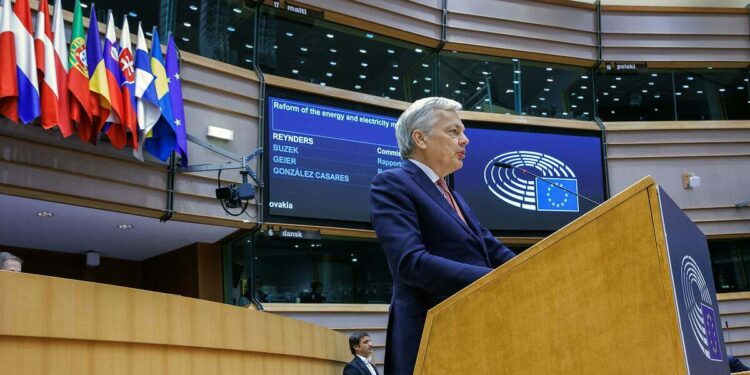The Russian military invasion of Ukraine jeopardized the security of the European Union’s energy supply. The rise in gas prices also pushed up the cost of electricity, and in an energy crisis situation, the bloc took action. The full European Parliament backed the reform of the electricity market on Thursday, aiming to make electricity prices less dependent on fossil fuel volatility, protect consumers from price increases, accelerate the deployment of renewable energies, and improve consumer protection.
With 433 votes in favor, 140 against, and 15 abstentions, Members of the European Parliament supported a regulation that seeks to make the EU electricity market more stable and sustainable. After Parliament’s approval, the twenty-seven Member States must also formally adopt the legislation, the final step in the process for it to become law. The regulation includes a clause allowing EU countries to prohibit energy companies from interrupting electricity supply to the most vulnerable consumers.
The reform includes contracts for difference so that public authorities can compensate energy suppliers if market prices experience significant declines and charge them if prices are too high. Additionally, these types of contracts can be used in new electricity production investments, whether from renewable or nuclear energy.
Furthermore, the regulation includes a mechanism that will allow declaring an electricity price crisis in case, as happened after the Ukraine war, prices skyrocket in the EU. Under the reform, Member States can take temporary measures to set energy prices for SMEs and energy-intensive industrial consumers.
Accelerating renewables
At the beginning of the day, during the debate on the electricity market reform in the European Parliament, Justice Commissioner Didier Reynders, standing in for Energy Commissioner Kadri Simson, indicated that the electricity market reform “will accelerate the deployment of renewables,” create “a more effective framework empowering those energy markets” and “boost energy acquisition contracts.”
But not only that, the Belgian Commissioner emphasized that this reform will allow for greater “integration of decarbonized gases into natural gas networks” or “greater legal certainty to decarbonize” the economy. It will also allow decoupling energy generation and distribution, improving operation, promoting distribution network development, and developing a hydrogen market.
Popular MEP Pilar del Castillo Vera emphasized that the reform aims to “reduce the influence of prices on consumers’ bills,” “a more stable energy cost,” and “promote investment in renewables.”
She also highlighted the importance of measures such as promoting bilateral electricity contracts, public support through contracts for difference that can be used to increase coal and gas capacity and efficiency and extend the lifespan of nuclear power plants. She also recognized the importance of interconnections and emphasized protecting the most vulnerable consumers.
On the other hand, socialist MEP Nicolás González contextualized that the “brutal price increase generated an inflation crisis.” While conceding that many voices did not believe the reform was necessary, its benefits “will be better seen in the medium and long term.”
The decoupling of consumers from gas prices, the integration of new renewable energies, or the right to share energy are some of the milestones of this legislative text according to the Galician socialist.
Agreement between the EU Council and the European Parliament
The ratification in the European Parliament comes after, last December, the Member States and the European Parliament reached a provisional agreement on electricity market reform. Based on this agreement, EU countries will be able to exclusively support the purchase of new renewable generation when conditions permit and in line with the decarbonization plans of Member States.
Regarding voluntary standardized contracts, both institutions agreed to maintain their voluntary nature. The provisional agreement also foresees an assessment by the Agency for the Cooperation of European Energy Regulators (ACER) on the PPA market based on information from the database provided for in the REMIT regulation.


